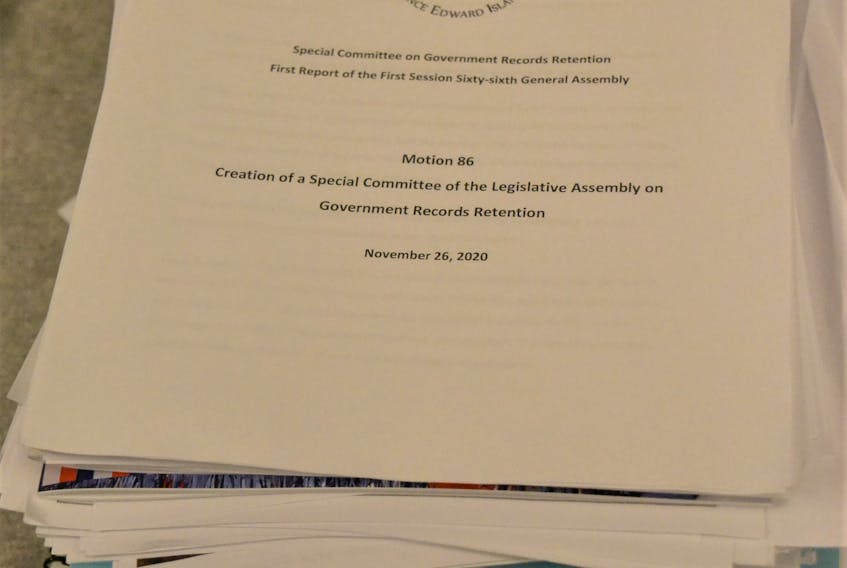CHARLOTTETOWN, P.E.I. — A report by an all-party standing committee, tasked with looking into two years’ worth of missing internal emails linked to the e-gaming saga, is recommending the province legislate a ‘duty to document’ provision, which would require public servants to record departmental deliberations and decisions.
However, the committee’s report contains no firm answers to the question of what happened to two years of missing internal emails linked to a former employee of Tourism P.E.I.
The final report of the special committee on government records retention was tabled late last week. In July, the committee was tasked with carrying out a six-month investigation of the government records retention practices that lead to the disappearance of the emails of Brad Mix, a civil servant who played a role in a tourism loyalty card program, an initiative linked to the failed e-gaming initiative.
The committee was struck after the release of a report from the province’s information and privacy commissioner that found the missing emails constituted a contravention of the Archives and Records Act. The commissioner also found that a reasonable search was conducted for the emails, but that provincial officials failed to respond to a freedom of information request “openly, accurately and completely.”

The special committee’s report included eight recommendations focused on improving digital records management practices, that could ensure emails and digital records are retained and are reliably accessible through freedom of information requests.
The “duty to document” recommendation called for amending the Archives and Records Act to include the provision. British Columbia passed similar legislation in 2017.
The report also recommended 80 per cent of government staff in all departments complete training in records information management by the end of March 2021. Another recommendation called for a routine disclosure policy, that would allow for automatic release of some internal records to the public upon request.
The committee also wants government to define vital electronic records in order to ensure these files, such as deeds, maps and legal records, are protected from deletion. Another recommendation called for ensuring all public bodies retain all non-transitory records until they establish rules of which records can be kept and for how long.
Finally, the committee recommended the development of a new three-year recorded information strategy across government.
IT staff told the committee the province was in the midst of transitioning from the current GroupWise email service to an Office 365 application, which could automatically classify which emails and records would be retained, and which would be considered transitory.
Initially, the committee had sought clarity on how exactly emails from the account of Mix, a former employee of Tourism P.E.I., could not be found during the time period between 2010 and 2012.
“A special committee is, I would say, the only way to re-establish public trust in our records retention systems and to finally find out the answer to that now infamous question: Who deleted the emails?” Opposition Green Leader Peter Bevan-Baker told the legislature in June.
But as time went on, it became clear it was unlikely the committee would be able to definitively tell what happened to the missing emails.
Mix, speaking before the committee, said he discovered the emails were missing in 2015. He said provincial IT staff told him the emails from his GroupWise account could have been lost due to a mobile phone upgrade.
John Brennan, director of business infrastructure for the province’s Information Technology Shared Services (ITSS), said the emails would have had to have been deleted by an individual or would have been archived to a site off of government networks.
Karen Rose, the former privacy commissioner and author of the report related to the Mix emails, said there was insufficient evidence to conclude that an individual in government willfully destroyed the emails. Rose also told the committee she doubted the committee would be able to determine how the emails were lost.
By the end of October, Bevan-Baker told The Guardian he did not believe the public would ever find out what became of the Mix emails.
Stu Neatby is the political reporter for The Guardian. [email protected] @stu_neatby









